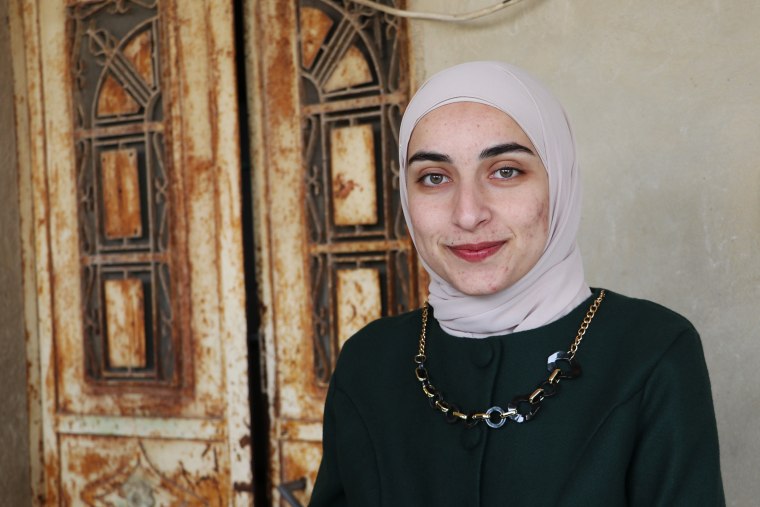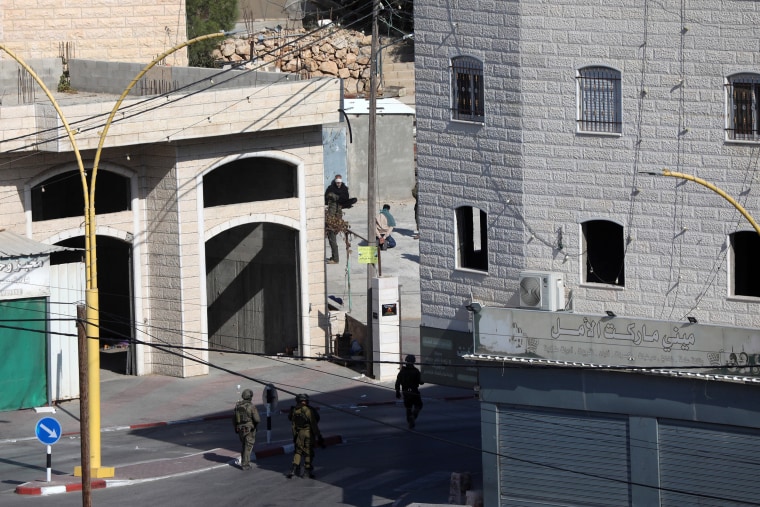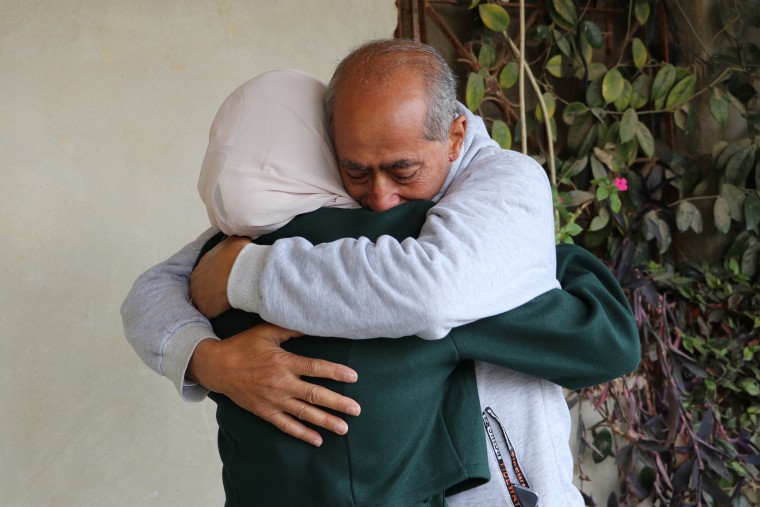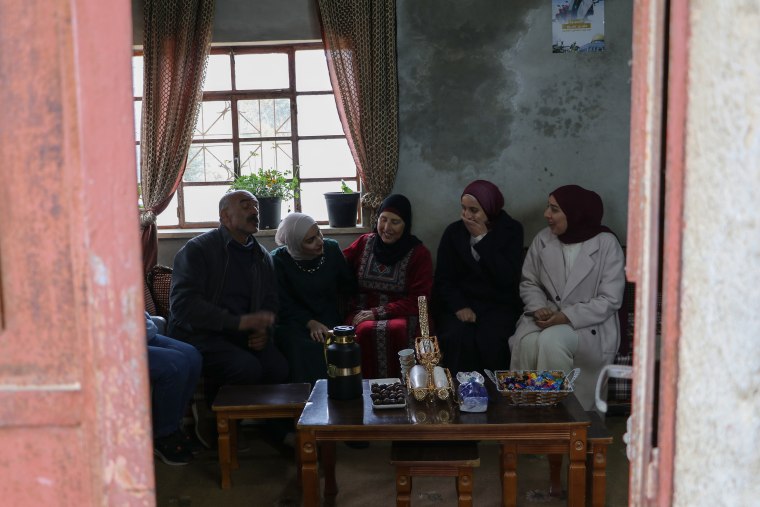DURA, West Bank — Israeli soldiers burst into her bedroom in the middle of the night as she slept, arresting her at gunpoint as her younger sisters watched on. But after more than a year in prison, Jenin Amro told NBC News she still doesn’t know why she was detained.
Like all of the 90 Palestinian women and children released in the first hostage exchange between Israel and Hamas in January, she was labeled as a “terrorist” by the Israel Prison Service. But Amro denies any militant ties, and Israeli authorities have not responded to multiple requests for specific details on why she was held for over a year.
“How am I a terrorist? I was a university student who attended, studied and lived with my family,” the 23-year-old told NBC News last month, two days after she was freed as part of the deal between Israel and Hamas and was allowed to return to her family home in Dura in the occupied West Bank.
Sitting in a plastic chair outside her family’s stone-built home surrounded by greenery and farm animals, Amro said she was “in shock” as she was taken to Damon Prison near the Israeli city of Haifa.
“I was wondering what was happening and why this was happening to me,” she said.
Nearby, her father, Mohammad Amro, 58, watched on with a look of concern for his eldest daughter while Amro’s younger sister Boshara, 21, stood beside him. Her mother, Hind Taleb Amro, 58, and other siblings were all close by.
Her uncle Raef Mohammed Amro, who said his journey from Jenin in the West Bank’s north to Dura to see her had taken 10 hours instead of two because of Israeli checkpoints, embraced her with a warm hug.

Describing the Damon Prison as “unfit for human habitation,” Amro said with a soft but determined voice that she and the other women suffered physical and verbal abuse from Israeli guards.
Some were “beaten,” she said, recalling one case where a woman who had difficulty walking was dragged on the floor and “no one was allowed to help.”
While she said she hadn’t weighed herself since her release, it was “clear” she had lost weight during her time in detention. Meal sizes were small, she said, adding that the small amount of yogurt for breakfast and a plate of fries for lunch would be shared between groups of detainees.
She said all of the women she was detained with were Palestinian and that some had been arrested over social media posts, while others, like her, had not been charged.
The reality of her situation “didn’t fully register until the very last day,” adding that she still struggled to understand whether she was able to to leave “and return to my life.”
The Israel Prison Service did not immediately respond to a request for comment on the conditions at the facility.
Asked why Amro was detained, the Israel Defense Forces referred NBC News to the Israel Security Agency, or Shin Bet. Shin Bet did not respond to multiple inquiries from NBC News and the Israel Prison Service did not respond to a request for comment.
Amro’s lawyer Ahmed Safia said that throughout her time behind bars, he had repeatedly asked Israeli authorities to explain why the young woman, who was studying agricultural engineering at Hebron University, had been detained, only to be told that the information was secret.
He said she was one of thousands of Palestinians held by Israel under a controversial practice known as “administrative detention,” which it uses to hold people without trial or other usual legal proceedings, based on alleged secret evidence it does not share with detainees, their families or legal representatives.
The practice has been criticized by rights groups like Amnesty International and Human Rights Watch that say it has been used to hold Palestinians without charge and due process. Israel has defended the practice as a necessary security measure.
Before some 580 Palestinian prisoners were released in the four exchanges for Israeli hostages during the current truce, Israel was holding 3,376 administrative detainees without trial, according to data from HaMoked, an Israeli human rights organization.

Meanwhile, inside Israel, ultranationalist lawmakers have criticized the ceasefire and hostage release deal. Among them is Itamar Ben-Gvir, who resigned from his post as national security minister in protest.
He has objected to the fact that hundreds of Palestinian prisoners will be freed and argued that it leaves open the possibility of Hamas staying in power in Gaza, where health officials say more than 47,000 people been killed in the Israeli military offensive since Oct. 7, 2023, though researchers estimate the death toll is likely significantly higher.
Israel began its campaign after Hamas’ multipronged attacks on the country in which roughly 1,200 people were killed and around 250 were taken hostage, according to Israeli tallies.
Despite the objections of Ben-Gvir and some of his fellow lawmakers, the first three Israeli hostages — Romi Gonen, Doron Steinbrecher and Emily Damari, a dual British citizen — were freed last month in exchange for 90 Palestinian prisoners and detainees, all of whom were women and children under the age of 19.
All of them, including Amro were described as “terrorists” by Israel, a fact that came as little surprise to Sarit Michaeli, international outreach director for Jerusalem-based human rights organization B’Tselem, who said Israel used it as a blanket term to describe the freed Palestinians.
In general, she said, many people detained by Israel “haven’t been charged with any sort of violent offenses,” and “some have not been charged at all.”
On Jan. 25, four female Israeli soldiers Daniella Gilboa, Naama Levy, Karina Ariev and Liri Albag were also released in exchange for 200 Palestinian prisoners, some of whom were serving life sentences after being convicted of deadly attacks.
But while the truce between Israel and Hamas has held for more than a week in Gaza, the Israeli military has ramped up military activity in the occupied West Bank, launching a major operation in the northern city of Jenin last week.

The offensive began after President Donald Trump rescinded American sanctions on far-right Israeli settler groups and individuals accused of involvement in violence against Palestinians in the territory, in one of his first acts in office.
Israel has occupied the West Bank since the Six-Day War against its Arab neighbors, which saw the country seize the West Bank and east Jerusalem from Jordan and the Gaza Strip from Egypt.
Since then, it has built and expanded Jewish settlements in the West Bank. Most countries deem them illegal under international law, a position disputed by Israel, which sees the territory as a security bulwark. In 2019, the first Trump administration abandoned the long-held U.S. position that the settlements are illegal before it was restored by his successor, Joe Biden.
Muted celebrations
Before she was released on Jan. 20, Amro’s family waited for hours in the cold at a rendezvous point for the freed prisoners.
Her younger sister Boshara said she “couldn’t describe the feeling” of having her sister home. In a voice note before Amro was released, Boshara said she was “like a mother to me, in her kindness and in everything she does.”

But throughout Amro’s detention, Boshara said she had no contact with her sister and was unable to visit her, adding that her family was disturbed by her sibling’s “very bad mental state, especially the mental and physical stress she was subjected too.”
In video shared with NBC News, Amro’s family and friends could be seen celebrating her return on Jan. 20. Wearing a flower crown, she could be seen being carried down the street on the shoulders of two men as she was greeted by a cheering crowd.
But Amro, her sister and their father said they received a visit from Israeli forces that day warning them not to celebrate again.
A spokesperson for the IDF denied its forces had specifically visited Amro’s family, but said they had been in the Dura area that day to disperse a march being held in support of Hamas.
As for Amro, she said she hoped to overcome the ordeal, finish her degree and eventually open a plant or flower shop, but she feared she would be detained again — a threat she said Israeli authorities made to her upon her release.
“I am more determined, strong,” she told NBC News in a message after her ordeal, adding that she planned to “continue my life with passion.”
Speaking outside her home last week, she said she wanted to share her story because she thought it was important for Palestinians to demand “our rights” and to shine a light on the “injustice happening” under Israeli detention.
“Everything I have experienced in prison makes me feel that the world should know,” she said.

